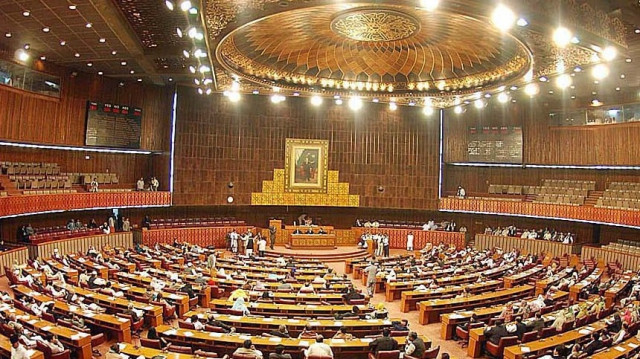Legislators at work: NA approves high-powered rights commission
Empowered to intervene into any proceedings involving rights violation allegations.

The National Assembly on Wednesday approved a bill aimed at establishing an independent human rights commission, with sweeping powers – at least on paper.
Moved by the adviser to the prime minister on human rights, Mustafa Nawaz Khokhar, the bill would empower the commission to assume the role of a court in special circumstances, with authority to take suo motu notice.
The bill received a unanimous approval when the government did not oppose, and incorporated 14 amendments moved by the opposition.
“The decision to establish an independent National Commission for Human Rights … not only fulfills the international obligation of establishment of such a commission but shall also serve as a driving force for negating the propaganda of human rights violation in Pakistan,” said a statement of commission’s objectives.
The commission will be headed by a retired judge from higher judiciary, or any other “eminent person of known integrity, competence and experience,” and would comprise two members from minority communities, one member from each province, Fata, Gilgit-Baltistan, Islamabad Capital Territory and a Secretary appointed by the commission. It would be empowered to intervene into any proceedings involving allegations of violation of human rights, and visit jails across Pakistan. The body, according to the draft of the bill, would have powers of a civil court while inquiring into complaints.
The commission has also been given the power to constitute special investigation teams of officers from police and other law enforcement agencies.
Gas load-shedding
Despite confessing before the assembly that “there would be more load-shedding in January,” Minister for Petroleum and Natural Resources Dr Asim Hussain brushed aside the assertion that the shortage could be construed as the government’s failure.
“[Load-shedding] is not a question of non-availability; rather, it is an issue of availability since there is no gas in the country,” the minister said in response to PML-N’s Abid Sher Ali’s threat to launch “civil disobedience movement” against the government if it did not ensure supply of gas to Punjab and federal areas.
“Did we give any energy policy in the past?” the minister rebuked PML-N members.
He urged protesting opposition lawmakers to join hands with the government to steer the country out of multiple crises, instead of politicking.
Giving details of province-wise production and consumption, Hussain said that Punjab produces 5% and consumes 45%, Khyber Pakhtunkhwa produces 9% and consumes 4%, Sindh produces 66% and consumes 44% and Balochistan produces 19% and consumes 7% of the country’s total gas.
Domestic consumption in Punjab had increased by 64%, K-P by 10%, Sindh by 22% and Balochistan by 2%, he added.
In addition, extensive use of CNG is another reason behind load shedding, the minister said, adding that consumption of gas by CNG stations in Punjab had increased by 47%.
Tariffs will be rationalised from January 2012, he said, adding that tariff for CNG stations will be raised. Earlier, Khawaja Asif of PML-N had suggested rationalising tariffs and giving targeted subsidies only.
Published in The Express Tribune, December 22nd, 2011.



















COMMENTS
Comments are moderated and generally will be posted if they are on-topic and not abusive.
For more information, please see our Comments FAQ